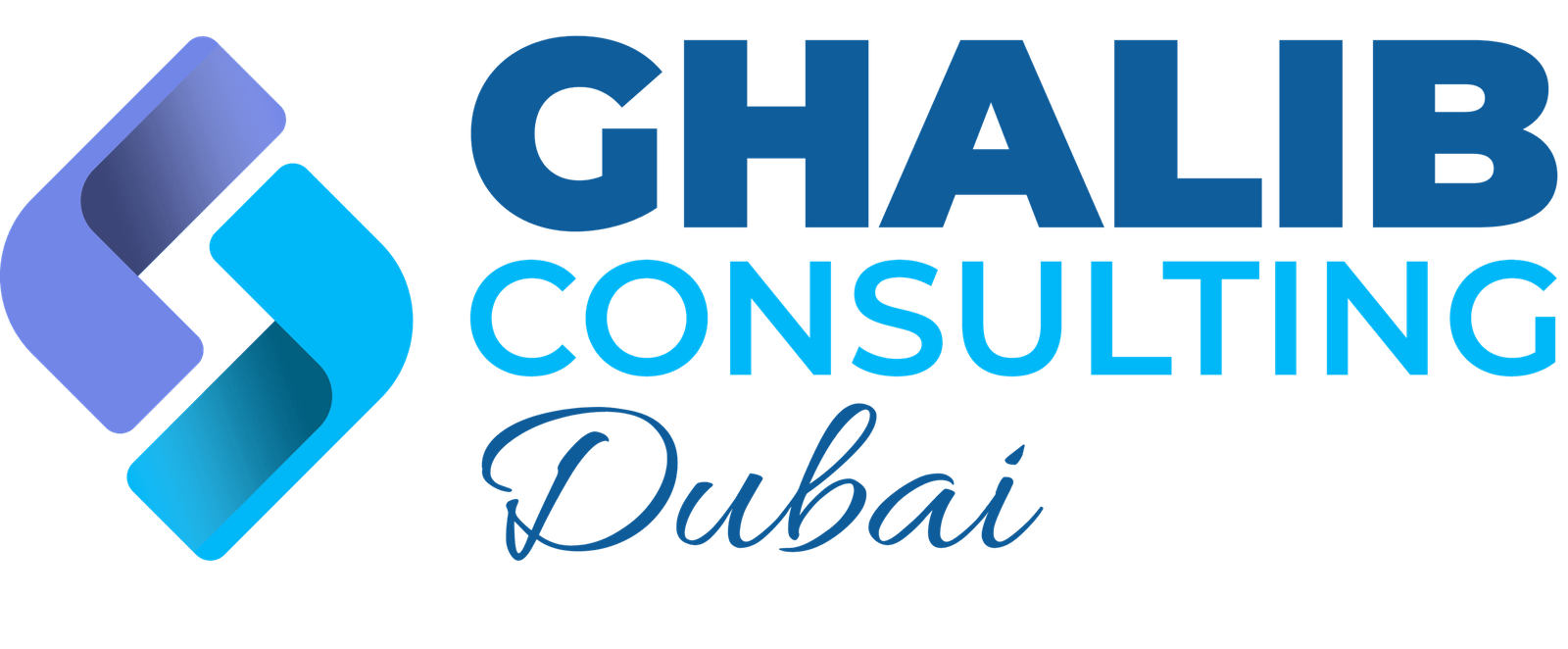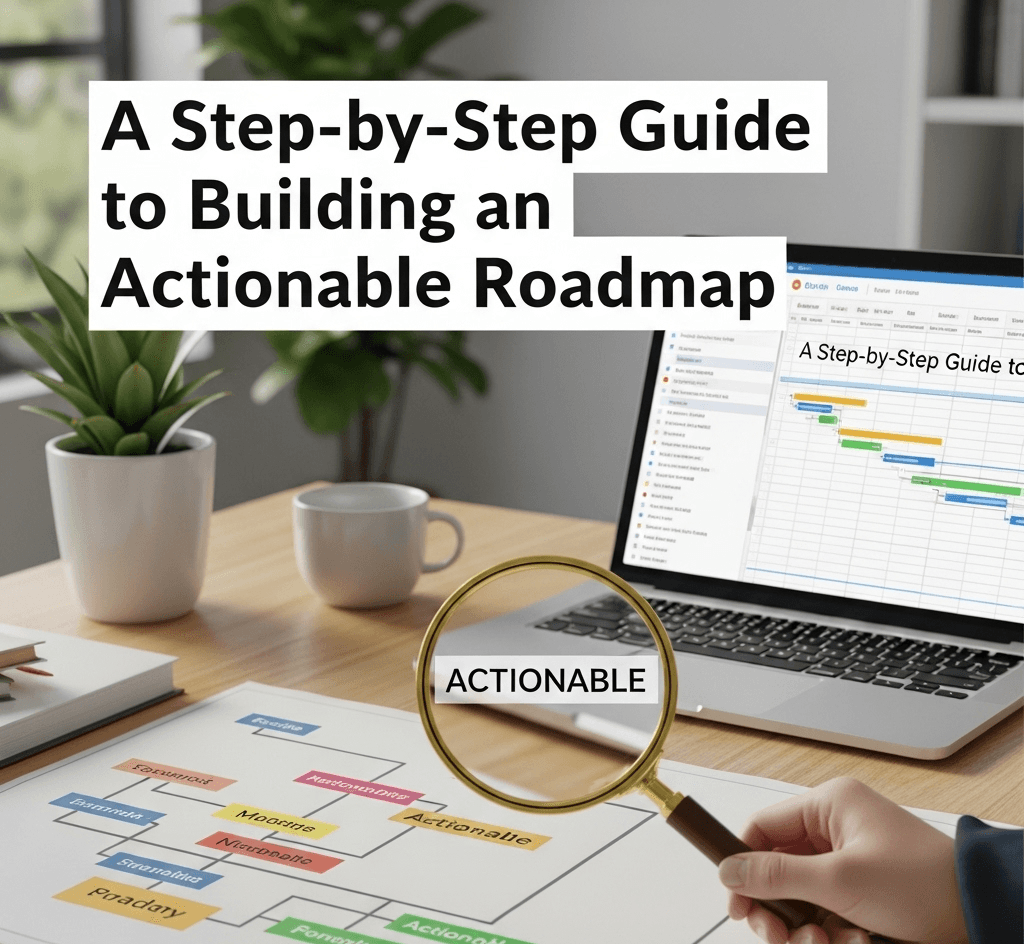Phone: +966-50-7024644 | Email: info@ghalibconsulting.com
Table of Contents
Build a Winning Business Roadmap: 8 Step Guide for UAE & KSA Companies | Ghalib Consulting
In the dynamic and competitive business landscapes of the United Arab Emirates and Saudi Arabia, having a bold vision is not enough. To truly capitalize on opportunities like Saudi Vision 2030 or the UAE’s diversification efforts, companies need a clear, actionable plan to get from where they are now to where they want to be. This is where a powerful business roadmap becomes indispensable.
An actionable roadmap is more than a high-level strategy; it’s a practical, visual document that aligns your entire organization, prioritizes initiatives, and tracks progress toward key goals. At Ghalib Consulting, we help businesses across the GCC turn ambition into achievable results. This step-by-step guide will show you how to build a roadmap that drives growth and ensures you stay on course.
Why is a Strategic Roadmap Critical for UAE & KSA Businesses?
The GCC region is undergoing rapid economic transformation. A well-defined roadmap helps you:
- Navigate Regulatory Landscapes: Stay agile amidst evolving policies and regulations.
- Align with National Visions: Directly tie your company’s goals to the broader economic agendas of KSA and UAE.
- Secure Investment: Demonstrate to investors and partners that you have a clear, structured plan for profitability and growth.
- Improve Operational Efficiency: Prioritize resources and avoid wasted effort on misaligned projects.

Your Step-by-Step Guide to Building an Actionable Roadmap
Step 1: Define Your Vision & Strategic Objectives
Start with the “why.” What is the ultimate goal for your business in the next 3-5 years? Are you expanding into a new emirate, launching a new product line, or aiming for a specific revenue target? Your objectives should be SMART: Specific, Measurable, Achievable, Relevant, and Time-bound.
- Example Objective: “Become the leading provider of [your service] in the Eastern Province of KSA within 3 years.”
Step 2: Conduct a Thorough Situation Analysis
Before you chart your course, understand your current position. This involves:
- SWOT Analysis: Identify your company’s internal Strengths and Weaknesses, and external Opportunities and Threats in the GCC market.
- Market Research: Analyze competitors in Dubai, Riyadh, or other key cities and understand evolving customer needs.
Step 3: Identify Key Initiatives and Themes
What major projects or themes will help you bridge the gap between your current state and your objectives? These are your strategic pillars.
- Example Initiatives: “Digital Transformation,” “Market Expansion into Abu Dhabi,” “Strategic Partnerships,” “Talent Emiratization/Saudization.”
Step 4: Break Down Initiatives into Actionable Projects
Here, you translate themes into work. For each initiative, define specific projects with clear deliverables, owners, and deadlines.
- Initiative: “Digital Transformation”
- Projects: “Launch e-commerce platform by Q4,” “Implement new CRM system by Q2,” “Develop a mobile app by Q3.”
Step 5: Prioritize and Sequence
You can’t do everything at once. Use a framework like the Value vs. Effort Matrix to prioritize projects that offer the highest return for the least effort. Sequence them logically—some projects will be prerequisites for others.
Step 6: Establish Key Performance Indicators (KPIs)
How will you measure success? Define clear KPIs for each objective and project.
- Example KPIs: Monthly Recurring Revenue (MRR), Customer Acquisition Cost (CAC), Market Share %, Project Completion Rate.
Step 7: Visualize and Communicate the Plan
Create a clear, visual timeline of your prioritized projects and milestones. Use a Gantt chart or a simple timeline tool. This visual roadmap must be shared with every team member to ensure company-wide alignment and buy-in.
Step 8: Implement, Monitor, and Adapt
A roadmap is a living document. Hold regular review meetings (quarterly is a good standard) to:
- Track progress against KPIs.
- Identify roadblocks and challenges.
- Adapt the roadmap to changing market conditions, new opportunities, or unforeseen challenges. This agility is key to success in the Middle East.
How Ghalib Consulting Can Help You Build Your Roadmap
Crafting a flawless roadmap requires deep expertise in strategic planning and financial modeling. Many businesses in the UAE and KSA have the vision but lack the structured approach to execute it. This is where we excel.
At Ghalib Consulting, we provide expert guidance to transform your vision into an actionable strategic plan. Our services include:
- Facilitated Strategy Workshops to define your objectives.
- Comprehensive Market and Financial Analysis specific to the GCC region.
- Financial Modeling to forecast outcomes and validate the financial viability of your initiatives.
- KPI Framework Development to ensure you can measure what matters.
We don’t just help you create a document; we help you build a system for achieving sustainable growth.
Ready to turn your business vision into an actionable reality? Contact Ghalib Consulting for a consultation and let us help you build a roadmap to success in the UAE and KSA.
📧 Email: ghalib@ghalibconsulting.com
📞 Phone: +966-50-7024644
Conclusion
An actionable roadmap is your company’s GPS for navigating the promising yet complex business environments of the UAE and Saudi Arabia. By following this structured approach, you can move from a grand vision to tangible results, ensuring every team member is aligned and every resource is invested in the right priorities. Start building your path to success today.

